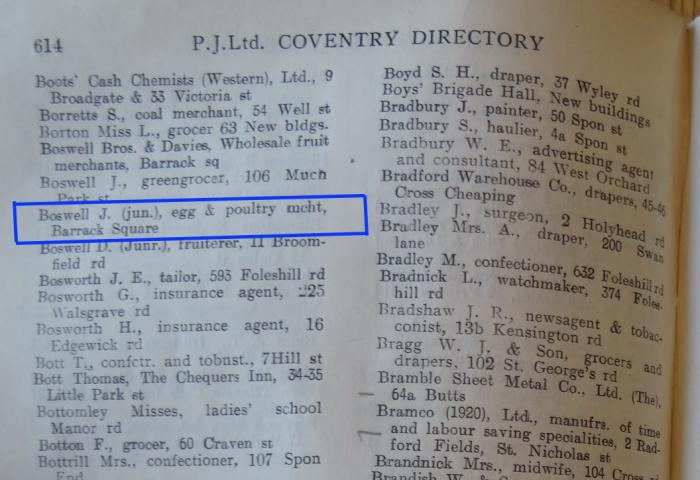
|
heathite
Coventry |
151 of 282
Mon 23rd Sep 2019 2:25pm
Is this the area Neil, Barrack Square 1926?

|
| Streets and Roads - Burges and Cross Cheaping | |
|
Midland Red
|
152 of 282
Tue 1st Oct 2019 2:10pm
On 23rd Sep 2019 1:48pm, NeilsYard said:
Love the second one, Neil 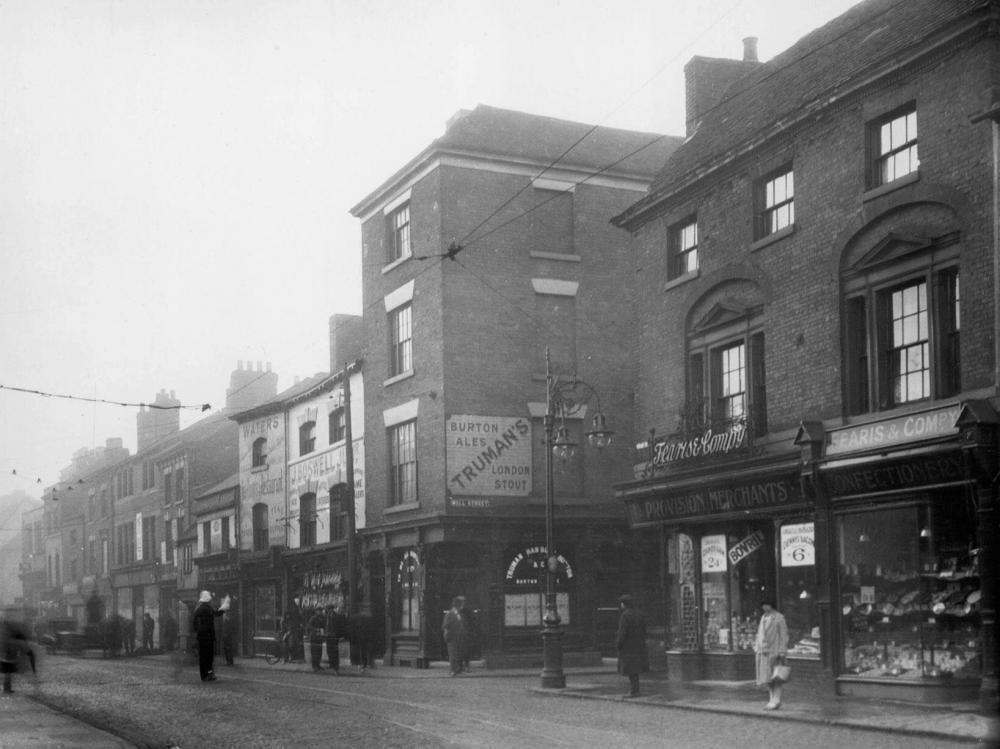
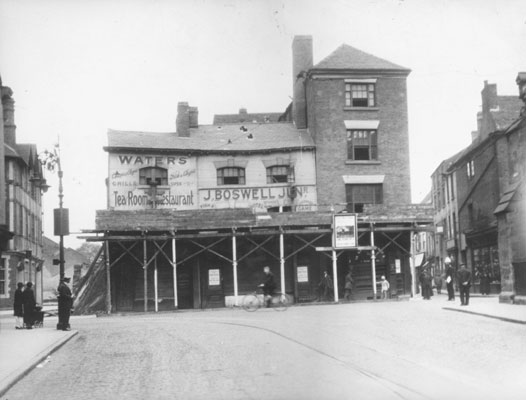
|
| Streets and Roads - Burges and Cross Cheaping | |
|
Kaga simpson
Peacehaven, East Sussex |
153 of 282
Tue 1st Oct 2019 2:37pm
Barrack Square was off Hertford St or thereabouts. |
| Streets and Roads - Burges and Cross Cheaping | |
|
NeilsYard
Coventry |
154 of 282
Tue 1st Oct 2019 3:50pm
They are off Rob's Library Images, Cliff - bizzare though isn't it that they left them standing whilst Corporation Street was going in and even whilst they built the Wine Lodge/Tally Ho which you can see on the left?! |
| Streets and Roads - Burges and Cross Cheaping | |
|
Helen F
Warrington |
155 of 282
Tue 1st Oct 2019 4:37pm
While the householders seem to have been moved on quite quickly, the businesses lingered till the last moment. A lot of pubs were along that stretch of Bishop Street and the south side of Well Street. Palmer Lane, Ironmonger Row and Butcher Row were being cleared at roughly the same time. The beer drinkers must have been in shock. |
| Streets and Roads - Burges and Cross Cheaping | |
|
NeilsYard
Coventry |
156 of 282
Wed 27th Nov 2019 5:45pm
I don't think this has been shared before -
Burges Conservation Area Townscape Heritage Project.
Some excellent images (FYI it's quite a large PDF). |
| Streets and Roads - Burges and Cross Cheaping | |
|
NeilsYard
Coventry |
157 of 282
Thu 13th Feb 2020 9:44am
Going back a bit but looking at Osmiroid's postcard in post #14 - does anyone know what that Coat of Arms is top right corner? The Fire Insurance maps have that building as being Liptons?
 *EDIT* actually think I may have it - Liptons were awarded the Royal Warrant from Edward VII (1841-1910) by 1907." I reckon that's it.
*EDIT* actually think I may have it - Liptons were awarded the Royal Warrant from Edward VII (1841-1910) by 1907." I reckon that's it. |
| Streets and Roads - Burges and Cross Cheaping | |
|
Kaga simpson
Peacehaven, East Sussex |
158 of 282
Fri 14th Feb 2020 1:23pm
Liptons went out of business in 1931, sold to 'Home and Colonial', think it was knocked down in '36 and went to the first Owens a few years later? |
| Streets and Roads - Burges and Cross Cheaping | |
|
Helen F
Warrington |
159 of 282
Fri 14th Feb 2020 3:50pm
If you search for old Lipton tins, some of them show the Royal Warrant for King George V, who died in 1936, so it all ties in. Yes, Kaga, it was demolished to build Owens. |
| Streets and Roads - Burges and Cross Cheaping | |
|
Kaga simpson
Peacehaven, East Sussex |
160 of 282
Sat 15th Feb 2020 12:24pm
Yes Helen but he also had royal warrants from Queen Victoria and Edward VII. He had many Tea plantations in Ceylon, cut out the middle man, would have met Leonard Wolfe, Governor (husband of Virginia Wolfe).
Somewhere close to that spot in the Burges was a house/shop that held a grouping of stone statues of Christ and his disciples, each in a canopied niche - Christ the centre one. The sculptor displayed his humour and abhorrence by leaving the end one, intended for Judas, vacant. Seems to have been brought from the altar of St Mary's Cathedral on the dissolution of the Priory, time of Henry the VIII.
Helen do you know if the Burges was closed, or the trams stopped in 1936, during the building? I think not. |
| Streets and Roads - Burges and Cross Cheaping | |
|
Helen F
Warrington |
161 of 282
Sat 15th Feb 2020 3:53pm
Hi Kaga, I only found tins with George V so maybe they put the warrant sign more subtly on the later packaging? 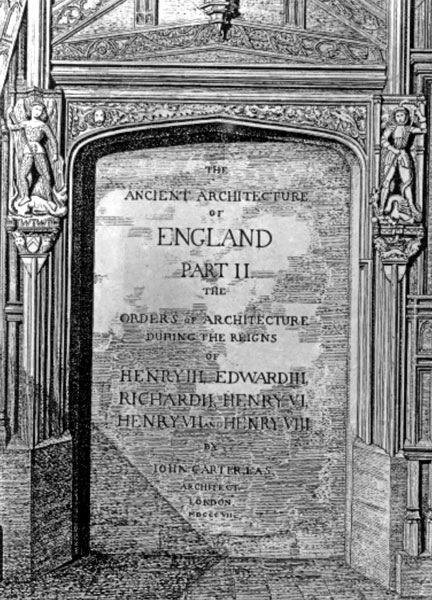 I don't think that they shut Cross Cheaping during the building works (different concept of health and safety) but the trams is a more complicated question. I'm not sure what ended the tram era - the war or something before. Somebody might know or if I work it out, I'll let you know.
I don't think that they shut Cross Cheaping during the building works (different concept of health and safety) but the trams is a more complicated question. I'm not sure what ended the tram era - the war or something before. Somebody might know or if I work it out, I'll let you know. |
| Streets and Roads - Burges and Cross Cheaping | |
|
Prof
Gloucester |
162 of 282
Sat 15th Feb 2020 6:28pm
Kaga I think that is fascinating about the stone statues of Christ and the disciples, and if it came from St Mary's, the first Cathedral that is fantastic. I have never heard anything of this before!!! Thank you. Can Helen tell us more? |
| Streets and Roads - Burges and Cross Cheaping | |
|
Kaga simpson
Peacehaven, East Sussex |
163 of 282
Sun 16th Feb 2020 11:42am
Helen,
We kept the tea tins to keep marbles, thimbles, pencil sharpeners, old fag cards, one held dad's shoe mending tacks, they were still there in our old house in '45, when we moved. Different sizes, not unlike the corned beef tin of today, old wooden date boxes for mother's knitting needles, everything had a use. I do believe one had that motif of Neil's on in a circle, but not sure. |
| Streets and Roads - Burges and Cross Cheaping | |
| Helen F |
164 of 282
Sun 16th Feb 2020 12:23pm
|
|
Helen F
Warrington |
165 of 282
Sun 16th Feb 2020 1:59pm
On 15th Feb 2020 6:28pm, Prof said:
Kaga I think that is fascinating about the stone statues of Christ and the disciples, and if it came from St Mary's, the first Cathedral that is fantastic. I have never heard anything of this before!!! Thank you. Can Helen tell us more?
I haven't seen a picture or map that makes any reference to the disciples. I believe that there might be a reference to the statues in Humorous Reminiscences of Coventry Life by T W Whitley which is a fantastic book that I really need to read as it has a lot of curious stories. I don't know if there is enough detail to work out exactly where they came from or even where they resided. They may not date back as far as St Mary's though as it would have been about 300 years later? I'd have thought that it would have been risky to keep them in the home after the Dissolution because they may have been considered Popish and it would have been even more risky during the Civil War as Coventry was heavily on the side of the Puritans. However St Mary's was broken up for salvage and most of the stuff was successfully sold so... Certainly if they were kept secret until religious fervour died down it could explain how the statues survived. Another possible source was other church salvage. eg Troughton and William Henry Brooke both drew statues that were replaced on St Michael's. Here are some of those that still remained when the cathedral was refurbished in the late 1800s. Even back then there were a lot of empty plinths.
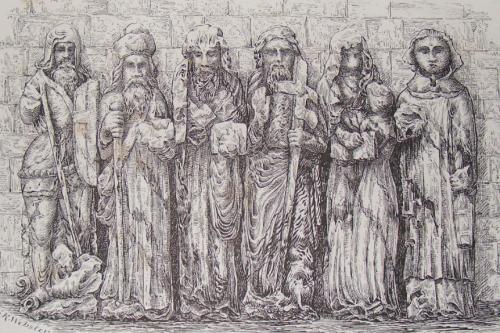
|
| Streets and Roads - Burges and Cross Cheaping | |
Website & counter by Rob Orland © 2024
Load time: 681ms